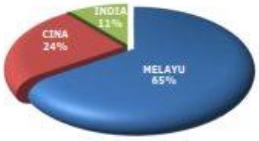A survey of public perception on the kalimah ‘Allah’ controversy was conducted by the Universiti Malaya Centre for Democracy & Elections last December (a year ago) among 1,676 respondents in the peninsula.
The pie chart below shows the ethnic breakdown of those who participated in the Umcedel poll.
- Malays – 65 percent
- Chinese – 24 percent
- Indians – 11 percent
Below are the Umcedel results
77 percent of the Malays surveyed do not agree for kalimah ‘Allah’ to be used by non-Muslims.
73 percent of the respondents (all races) living in the rural areas do not agree for kalimah ‘Allah’ to be used by non-Muslims.
It is the younger age cohorts who object more strongly to non-Muslims using kalimah ‘Allah’.
65 percent of those between 21-30 years old (all races) and 59
percent of those between 31-40 years old (all races) object to
non-Muslims using kalimah ‘Allah’.
The middle-aged (41-50 and 51-60) are slightly less vehement in their
objections, registering 54 and 56 percent naysayers respectively. This
is an interesting finding, i.e. the Merdeka babies have got a more
relaxed attitude on this matter compared to Gen Y.
The lower the education level, the more strenuously the respondents (all races) object to non-Muslims using kalimah ‘Allah’ (see small graph below).
Taking just the Malays alone, however, the percentage of those saying
“No, cannot” rises much higher to reach between 76% and 81%, and spread
almost evenly across all education levels (see big graph below).
Among the Malays who do not agree for non-Muslims to use kalimah ‘Allah':
- No education – 81 percent
- Form Three – 76 percent
- Form Five – 77 percent
- Form Six/Diploma – 78 percent
- Degree/Post-grad – 79 percent
The trend albeit not pronounced is that the lowest (81%) and highest
(79%) educated Malays at both ends of the spectrum are the ones who
object most strongly to non-Muslims using kalimah ‘Allah’.
Those falling in between, i.e. with secondary school qualifications
and non-degree holders are slightly more relaxed (76% – 78%) in their
attitude.
Overall, the majority of Malays – or almost four out of every five
Malay – are adamant that non-Muslims should not use kalimah ‘Allah’.
Data source: Umcedel
Churches are still using kalimah ‘Allah’
Given this hardline attitude of the Malays, the decision of the Christians to dig in their heels can only spell trouble.
A couple of days ago, the Christian Federation of Malaysia issued a press statement on the return of ‘Allah’ Bibles earlier confiscated from the Bible Society of Malaysia.
The bibles were recently released by Mais with a restriction stamp (below).
CFM said in response: “This blanket ban on the use of the Bahasa
Malaysia Bibles in the State of Selangor is unrealistic, given that
there are thousands of Sabahans and Sarawakians who reside and work in
the state of Selangor besides the thousands of West Malaysian Christians
who are conversant only in our national language.”
(Refer HERE on why Rev. Eu is a shameless spindoctor.)
The churches are insistent that they will continue using the ‘Allah’ Bibles.
Claiming “a gross injustice” against Malay-speaking Christians, CFM chairman Rev. Eu Hong Seng said that such a prohibition is ultra vires
Article 11 of the Federal Constitution in which Clause (3) (a) states
that “every religious group has the right to manage its own religious
affairs”.
This stand-off between the Christians and Muslims will drag on endlessly and becoming more acrimonious with each passing day.
90 percent watershed is passing point of no return
As it is, the various communities are huddling like birds of a
feather flocking together but still staying apart from other species of
birds.
An online poll that
I ran in my blog found that 91 percent of the 902 respondents wanted
the National Unity Consultative Council to be dissolved.
Granted that my survey on NUCC naturally contains an inbuilt bias due
to the pro-establishment slant of the readership but nonetheless, the
figure of 91 percent is lopsided. It is as partisan as 90 percent of the
Chinese supporting the opposition.
My poll ran for a week and the roughly 90:10 Agree-Disagree ratio was
maintained consistently throughout the whole period as the votes came
in.
Living up to the Christians’ expectation
At this time last year (Dec 2013), I conducted a survey on whether
the BN needed Chinese votes in GE14. A total of 69.5 percent of the
respondents said ‘No’.
Making a cross comparison of both poll results, 69.5 percent – see
above – is certainly less of an imbalance than the anti-NUCC 91 percent.
We might reasonably interpret this development to say that attitudes
are hardening on both sides.
The Christians should be careful what they wish for. The charges of
extremism, religious bigotry and hate that the evangelistas keep hurling
could become self-fulfilling prophecies.













No comments:
Post a Comment